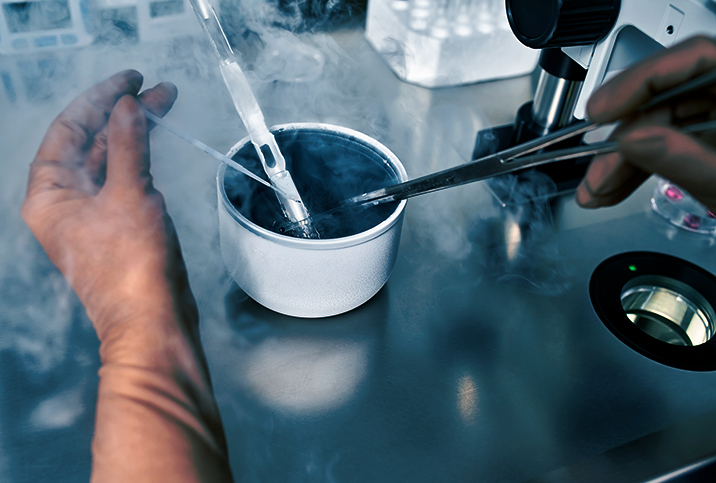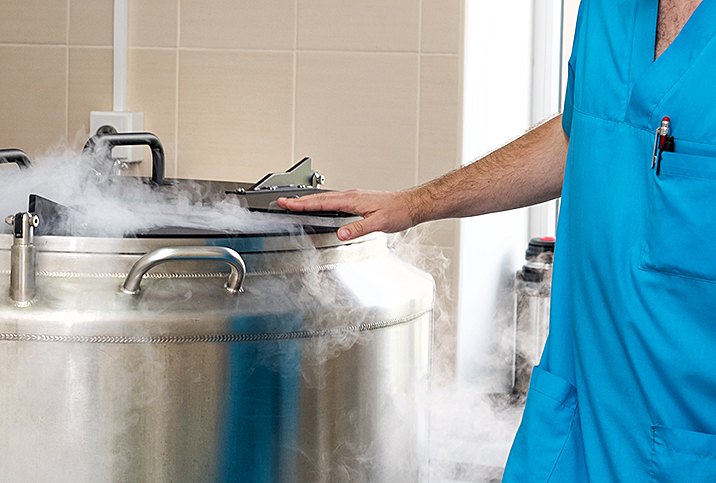Egg-Freezing Boutiques Aim to Attract the Younger Generation

While egg-freezing clinics aren't new, they have become increasingly popular over the last few years, with more women turning to them as a backup option during these challenging and uncertain times.
And egg-freezing boutiques—with their spa-like facilities and more affordable pricing plans—are the latest trend.
Egg-freezing's rise in popularity
Egg-freezing was first introduced in the 1990s to preserve the fertility of young women undergoing cancer treatment. But during this time, there was not enough data, so it remained an experimental procedure that was only offered to patients with certain illnesses.
Then, in 2012, the American Society for Reproductive Medicine (ASRM) and the Society for Assisted Reproductive Technology (SART) announced it would no longer be experimental. This was a big turning point that would allow women to freeze their eggs for nonmedical-related issues.
Women looking to delay having children due to personal reasons would now have the option of expanding their family in the future, when the time is right. According to USC Fertility, there has been a lot of success, with approximately 5,000 babies born from frozen eggs.
The boutique business owners focus on the feminist nature of egg-freezing: Women can now take their family-planning options into their own hands.
"Since COVID-19, we've seen a surge of more than 20 percent in inquiries about egg-freezing," said César Díaz-García, a fertility specialist and medical director of IVI London.
"This could be because limited social interaction and dating opportunities mean that people are looking for a backup option," Díaz-García continued, "but also worries about an uncertain economy and the pandemic's effect on health services could mean that both singles and couples would prefer to wait it out."
There are increasing worries about the future and the impact that environmental disasters could have on the younger generation. Egg-freezing can offer peace of mind and a solution to this growing problem, enabling women to make the decision that is right for them and their circumstances.
What boutiques offer
The cold clinic of old is being replaced with a new, friendlier setting: the egg-freezing boutique.
As more young people are freezing their eggs, egg-freezing boutiques are competing to attract the masses with youthful, Instagram-worthy aesthetics. These trendy boutiques even offer charging stations, coworking spaces and bubbly drinks. Some boutiques host events where women can join together, drink champagne and learn about their fertility options. The boutique business owners focus on the feminist nature of egg-freezing: Women can now take their family-planning options into their own hands.
Egg-freezing boutiques focus on appealing to the needs of their Millennial and Gen Z clientele with safe and welcoming environments that allow women to relax and feel at ease. Margaret Ryan, head of communications for Kindbody, described the clinics as being "warm and inviting, with approachable physicians, located in high traffic [areas], where consumers live and work."
The cost of egg-freezing is high and can vary extensively—and it's often not covered by insurance. This price is dependent on the type of clinic, the location of the clinic, the price of medications and the number of cycles you undergo. Because the cost is so prohibitive, many boutiques offer payment plans or discounts on services.
Extend Fertility offers a complimentary fertility assessment that involves a blood test and a consultation with a doctor. This gives you the chance to ask about the procedure and discuss any concerns you may have. Prelude Fertility offers flexible and transparent monthly payment plans that include fertility checks, screenings and any medications needed throughout the treatment. Meanwhile, Kindbody has "up to 30 percent savings on fertility services," according to Ryan.
What to consider
Before undergoing treatment, you should check the credentials of the clinic, read the reviews and ask to see their proven results. A good clinic will give you all of the answers you need, so you leave feeling safe and thoroughly satisfied.
"A low-cost treatment is an attractive offer, but you should make sure they also have the right level of experience to support you," Díaz-García advised. "Egg-freezing is a complex medical procedure: It's best to leave this responsibility to safe hands."
Egg-freezing involves a similar process as in vitro fertilization (IVF), in which daily injections will need to be self-administered. There are emotional and physical effects on the body, so you should ask for help and support during and after treatment.
You will need to take into account your age, lifestyle, and any medical conditions you have. Freezing your eggs doesn't guarantee a successful pregnancy, and a good clinic will clearly communicate that.
"Freezing eggs works best when you're younger and naturally more fertile, so we recommend that people do it before the age of 35 if they can," Díaz-García said. "As a guideline, if you freeze 15 eggs before you turn 35, your chance of having a baby (known as a live birth) is nearly 70 percent. If you freeze 15 eggs after the age of 35, this drops to 38 percent."


















